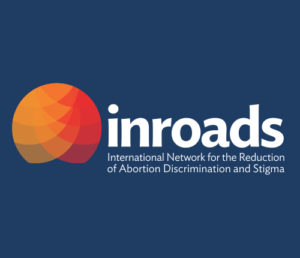Imagine a world without the stigma surrounding abortion. Abortion would be recognized as health care. People would not be deprived of their right to make their own reproductive decisions. Abortion providers would not be isolated or face physical threats on their lives.
A world free of abortion stigma is the vision driving the work of the International Network for the Reduction of Abortion Discrimination and Stigma (inroads), a network and global community of practice that grew out of a 2013 meeting on abortion stigma co-convened by Ipas and Advancing New Standards in Reproductive Health (ANSIRH). Inroads was launched following that meeting, with Ipas serving as its host and providing operational support. Today inroads is a network of scholars, advocates, health providers and donors representing 1,500 members and 105 countries.
 “For the past six years, in partnership with Ipas, the inroads network has been able to grow and establish itself as one of the leading global communities of practice geared toward ending abortion stigma and discrimination,” says Katie Gillum, inroads Executive Director. “As of September 1, 2020, inroads is transitioning into an independent organization. Our growing global staff and network members are committed more than ever to fighting stigma and its root causes and consequences as we adapt to new and unprecedented changes in the landscape of abortion and reproductive rights.”
“For the past six years, in partnership with Ipas, the inroads network has been able to grow and establish itself as one of the leading global communities of practice geared toward ending abortion stigma and discrimination,” says Katie Gillum, inroads Executive Director. “As of September 1, 2020, inroads is transitioning into an independent organization. Our growing global staff and network members are committed more than ever to fighting stigma and its root causes and consequences as we adapt to new and unprecedented changes in the landscape of abortion and reproductive rights.”
Ipas President and CEO Anu Kumar, one of the founders of inroads, says the goal from the beginning was for inroads to become an independent organization: “We are proud that Ipas was able to launch inroads and support them as their work got under way. Abortion stigma is a global phenomenon that requires concerted and dedicated action to dismantle. We look forward to working with the inroads community to continue this important work.”
“The impact of abortion stigma extends far beyond women,” adds Kumar. “It marginalizes abortion care, facilities and providers. It shames and silences women and providers, and it is a major contributor to unsafe abortion. And though stigma is pervasive and operates at many levels, we still don’t fully understand it. That’s why the work inroads is doing is so critical.” A 2009 article Kumar co-authored established the definition and framework for the phenomenon of abortion stigma, creating a new area of focus for scholars and advocates.
Gillum says the efforts to understand and mitigate the effects of abortion stigma “are part of the larger intersectional goal of supporting sexual and reproductive autonomy and abortion access for all people who need abortions. Because so much of the burden of stigma falls on the shoulders of smaller organizations and isolates researchers, providers and lawmakers even in larger systems for their association with abortion, inroads’ focus continues to be to center abortion stigma and discrimination in popular discourse within and outside of the abortion movement, to gather and connect those who are doing the work for the purposes of capacity and resource sharing, and to facilitate the use of evidence in interventions and decision making.”
“The innovation and passion of inroads members has helped bring about our network’s ‘graduation’” says Gillum, “and I look forward to the new and powerful ways inroads members will continue in collaboration to co-create our community of practice.”



